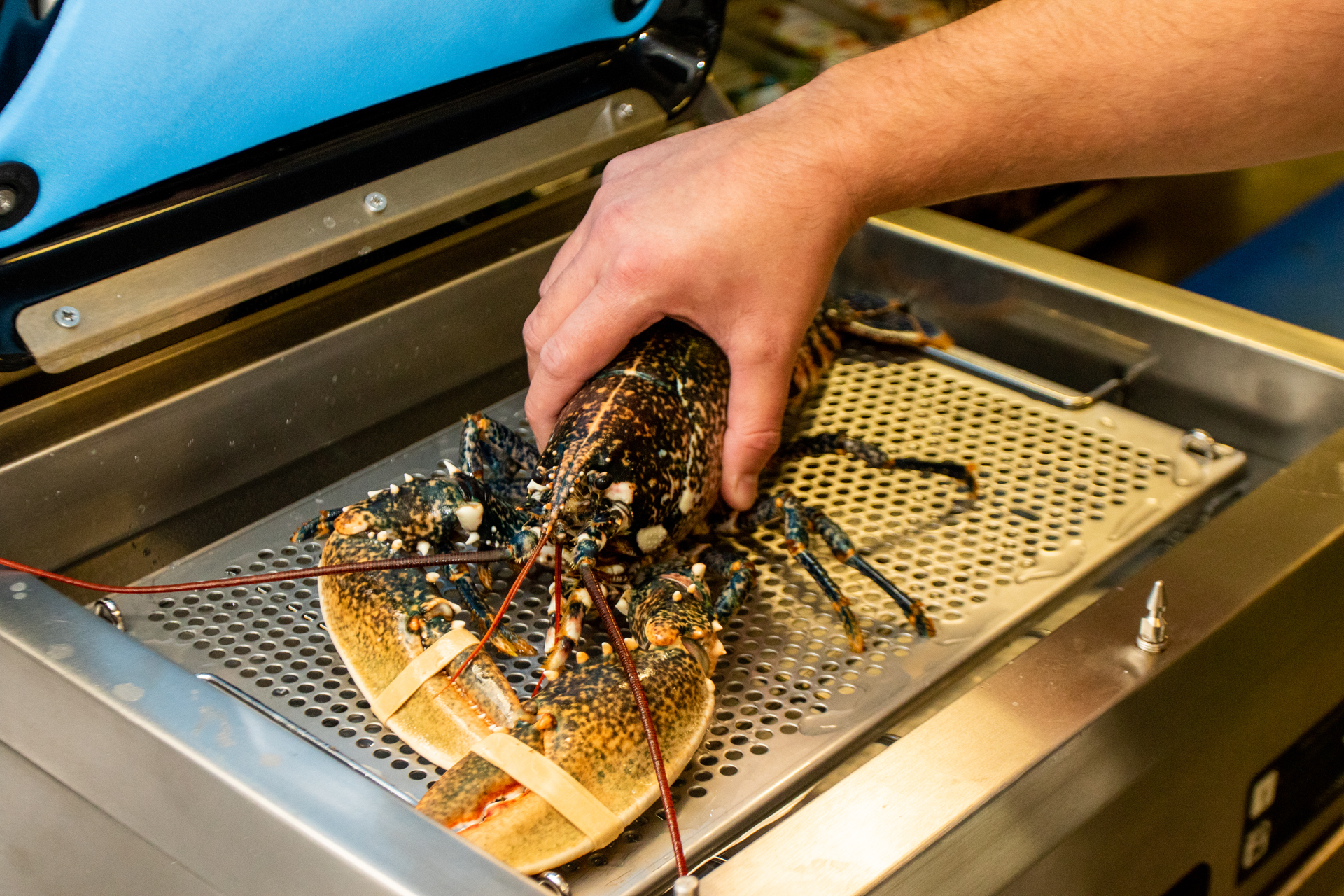Crustastun: Top Chefs Support Humane Dispatch of Lobster and Crab in their Kitchens
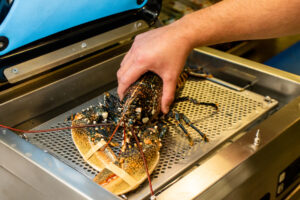
There is a belief in kitchens that the best way to achieve flavour in shellfish is to hold it alive until the last minute and then quickly kill it and cook it. This method has stood the test of time. Lobsters and crabs are routinely plunged, alive, into boiling water in the mistaken belief that they don’t suffer.
According to The British Veterinary Association (BVA) all shellfish including lobsters, crabs and langoustines do feel the pain of being boiled while still alive. They are sentient creatures and can feel pain and do not die instantly. The BVA are currently campaigning for the law to change to include all decapod crustaceans.
Leading chefs have leant their names to the cause and for good reason – using a humane stun process achieves an unexpected bonus. Here’s what chef Raymond Blanc said:
“We believe that the new Crustastun system is an important advance from an ethical point of view and have discovered that it also enhances texture and flavour.”
This makes sense. In butchery stressed animals at slaughter are known to create tougher meat. Currently decapods are not legislated for in terms of animal cruelty because they are not classed as animals.
 Chef Gary Jones, Executive Head Chef at Le Manoir aux Quat’Saisons, said this:
Chef Gary Jones, Executive Head Chef at Le Manoir aux Quat’Saisons, said this:
“We’re very pleased with the Crustastun machine. It is very fast, efficient and easy to use. Nobody enjoys cooking lobsters and crabs alive and not only is this machine more humane than traditional methods but we are noticing an improvement in the quality of the finished product – sweet, tender, clean and ethical.”
Another advocate of stunning live shellfish is Giorgio Locatelli of London restaurant Locanda Locatelli. He told The Daily Mail:
“In my opinion, not only is it more humane it also improves the quality of the meat. Many years ago my wife saw a chef put a live lobster in a pot in our kitchen and nearly divorced me. Since then we have used a stunning machine.”
Maisie Tomlinson of Crustacean Compassion said:
“We call ourselves a nation of animal lovers, but crabs and lobsters are Britain’s forgotten animals. What happens to them at slaughter is cruel and unacceptable. Unless these animals have been electronically stunned, it can take up to three minutes for a crab to die in boiling water and even longer for a lobster.”
The BVA have not stopped at decapods but are also campaigning for protections for octopus and squid, as well as fish caught on commercial trawlers. They state that some fish, including cod and haddock, can suffocate if caught in the middle of the net while those still alive and stored on ice can take up to two hours to die.
The Chefs’ Forum recently met up with esteemed chefs Michael Nizzero, Carl Claghorn and Rupert Taylor for a day of menu development at Bowood House.
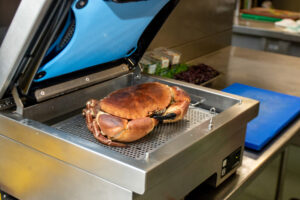 The finest Cornish lobster and crab were ordered in from Flying Fish.
The finest Cornish lobster and crab were ordered in from Flying Fish.
Flying Fish pride themselves on sourcing the finest Lobster from local fishermen in Newquay, Par and Port Issac and the crab are all from Brixham in south Devon.
“Its great to see chefs making a conscious effort to back this cause. As a company we source our pot caught lobster and crab from sustainable sources in Devon and Cornwall. It’s great to see chefs treating them with the same level of compassion and respect in the professional kitchen, as when they are caught. The way they are sourced, optimises the quality of the product on the plate and eating experience for the diner. Stunning crustaceans has been proven to enhance the eating quality of lobster, crab and langoustines as they are less stressed as a result and their meat more tender.”
Johnny Godden, Founder, Flying Fish, Cornwall
Michael Nizzero was first to showcase his signature dish of pan-fried lobster, spinach, potato and mandarin emulsion. Michael is Roux-trained and became Premier Sous-chef at The Ritz from 2015-2017. He also won a Michelin star in France at L’hostellerie la Briquetterie (Champagne region) – He was actually the youngest Michelin-starred chef in France at that time at the age of just 28 years old.
Michael loves this dish as it is classic and very seasonal and celebrates the delicate flavour of the sustainable Cornish lobster with citrus notes of the mandarin.
Michael said
“Its time to make big changes. 2020 has pushed us to make huge changes in our lives, so its great to be encouraging my chef peers to consider more humane methods of dispatching decapod crustaceans in the kitchen with the Crustastun.”
The second recipe was a mouth-watering Butter Poached Lobster with Carrot & Orange by Carl Cleghorn, new Executive Chef at Thornbury Castle near Bristol. Carl opted to cook this recipe as it has proved a long-standing favourite on any menu it graces.
“The inspiration for the dish came from my brother Chris, Head Chef at Michelin-starred Olive Tree Restaurant in Bath. The freshness and cleanness of the flavours marry very well with the sweetness of the lobster. There will be a rich aromatic flavour as the heritage carrots bring sweetness to balance with the lobster, accompanied by the aromatic lobster bisque which adds richness.”
The third recipe to round-up a fascinating day of knowledge share and recipe inspiration was host Rupert Taylor’s dish of Brixham Crab with Thai Puree, yuzu, kohlrabi and cucumber. This dish is extremely popular in Shellburne Restaurant, a Two AA Rosette grand restaurant with views across the practice golf course
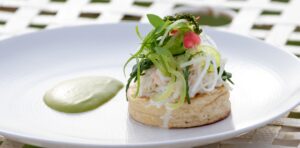 Rupert was delighted to host the day and he said
Rupert was delighted to host the day and he said
“It was great to work with my chef peers and Mitchell & Cooper to create some delicious recipes made from humanely dispatched crab and lobster. There is much to be done in terms of educating chefs to think more carefully about causing less stress to crustaceans, now it has been proven that they do indeed feel pain. Customers are always asking about how their food is sourced and how it reaches their plates and its great to be able to tell them that we promote sustainable sourcing and humane dispatch of crab and lobster in our restaurant, making for the best possible dining experience.”
A spokesperson for The Department for Environment, Food and Rural Affairs confirmed that the UK slaughter welfare standards were under review.
The premise of Crustastun is straightforward. The lid of the unit contains an electrode and a damp electrode sponge. The base of the unit contains a tank of salt water, with another electrode.
The animal is placed belly down on a sprung tray in the unit. As the lid is closed, the shellfish and tray are pushed down by the electrode sponge into the saline solution. The operator then presses one of the stun buttons on the front of the machine and a current passes through the 13 brain centres of a lobster, or the two brain centres of a crab.
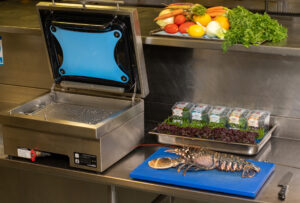 The stun current works by instantly interrupting the nerve function, so that the shellfish cannot receive stimuli and therefore cannot feel pain. This takes less than half a second. The prolonged application of the stun, for up to ten seconds, kills it.
The stun current works by instantly interrupting the nerve function, so that the shellfish cannot receive stimuli and therefore cannot feel pain. This takes less than half a second. The prolonged application of the stun, for up to ten seconds, kills it.
This method has been researched by Dr David Robb of Bristol University, UK. Dr Robb has scientifically established that a current of 1–1.3 amps, applied for five to ten seconds, is required to stun and kill a shellfish. Crustastun uses a typical current of 4–6 amps to ensure that shellfish die quickly, with an absolute minimum of distress.
The electro-stunning technique is in stark contrast to killing methods such as freshwater drowning, where a crab can take 12 hours to die, depending on water temperature. During this time the animals produce stress hormones such as cortisol, which adversely affect meat quality. Crabs and lobsters dispatched using Crustastun produce meat of noticeably better taste and texture.
 Guy Cooper, Managing Director of Mitchell & Cooper concluded
Guy Cooper, Managing Director of Mitchell & Cooper concluded
“It was amazing to work with such talented chefs to showcase how the Crustastun can be used in professional kitchens to eliminate the stress and suffering of crustaceans, with the added benefit of improving taste and texture of the meat. We look forward to raising the profile of this method of humane dispatch and working with chefs all over the country to promote compassionate treatment of lobster and crab in food preparation.”
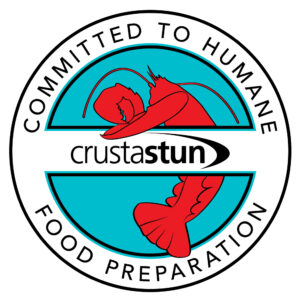 Crustastun is available from Mitchell & Cooper and any chefs interested in learning more can contact Guy on 01825 765511 or email sales@mitchellcooper.co.uk
Crustastun is available from Mitchell & Cooper and any chefs interested in learning more can contact Guy on 01825 765511 or email sales@mitchellcooper.co.uk
